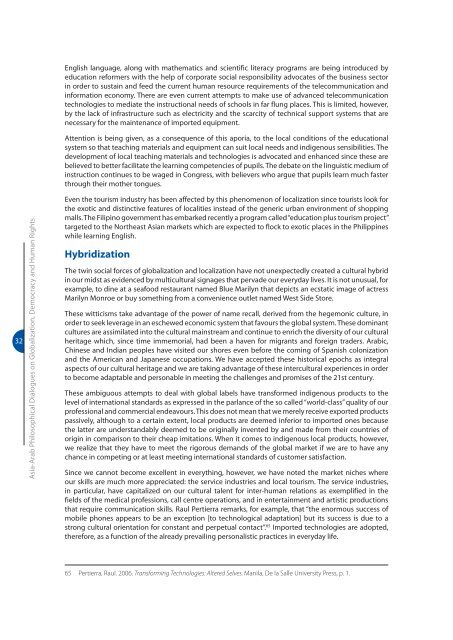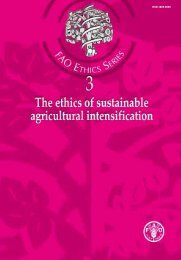Asian-Arab philosophical dialogues on globalization, democracy ...
Asian-Arab philosophical dialogues on globalization, democracy ...
Asian-Arab philosophical dialogues on globalization, democracy ...
You also want an ePaper? Increase the reach of your titles
YUMPU automatically turns print PDFs into web optimized ePapers that Google loves.
English language, al<strong>on</strong>g with mathematics and scientific literacy programs are being introduced by<br />
educati<strong>on</strong> reformers with the help of corporate social resp<strong>on</strong>sibility advocates of the business sector<br />
in order to sustain and feed the current human resource requirements of the telecommunicati<strong>on</strong> and<br />
informati<strong>on</strong> ec<strong>on</strong>omy. There are even current attempts to make use of advanced telecommunicati<strong>on</strong><br />
technologies to mediate the instructi<strong>on</strong>al needs of schools in far flung places. This is limited, however,<br />
by the lack of infrastructure such as electricity and the scarcity of technical support systems that are<br />
necessary for the maintenance of imported equipment.<br />
Attenti<strong>on</strong> is being given, as a c<strong>on</strong>sequence of this aporia, to the local c<strong>on</strong>diti<strong>on</strong>s of the educati<strong>on</strong>al<br />
system so that teaching materials and equipment can suit local needs and indigenous sensibilities. The<br />
development of local teaching materials and technologies is advocated and enhanced since these are<br />
believed to better facilitate the learning competencies of pupils. The debate <strong>on</strong> the linguistic medium of<br />
instructi<strong>on</strong> c<strong>on</strong>tinues to be waged in C<strong>on</strong>gress, with believers who argue that pupils learn much faster<br />
through their mother t<strong>on</strong>gues.<br />
32<br />
Asia-<str<strong>on</strong>g>Arab</str<strong>on</strong>g> Philosophical Dialogues <strong>on</strong> Globalizati<strong>on</strong>, Democracy and Human Rights<br />
Even the tourism industry has been affected by this phenomen<strong>on</strong> of localizati<strong>on</strong> since tourists look for<br />
the exotic and distinctive features of localities instead of the generic urban envir<strong>on</strong>ment of shopping<br />
malls. The Filipino government has embarked recently a program called “educati<strong>on</strong> plus tourism project”<br />
targeted to the Northeast <str<strong>on</strong>g>Asian</str<strong>on</strong>g> markets which are expected to flock to exotic places in the Philippines<br />
while learning English.<br />
Hybridizati<strong>on</strong><br />
The twin social forces of globalizati<strong>on</strong> and localizati<strong>on</strong> have not unexpectedly created a cultural hybrid<br />
in our midst as evidenced by multicultural signages that pervade our everyday lives. It is not unusual, for<br />
example, to dine at a seafood restaurant named Blue Marilyn that depicts an ecstatic image of actress<br />
Marilyn M<strong>on</strong>roe or buy something from a c<strong>on</strong>venience outlet named West Side Store.<br />
These witticisms take advantage of the power of name recall, derived from the hegem<strong>on</strong>ic culture, in<br />
order to seek leverage in an eschewed ec<strong>on</strong>omic system that favours the global system. These dominant<br />
cultures are assimilated into the cultural mainstream and c<strong>on</strong>tinue to enrich the diversity of our cultural<br />
heritage which, since time immemorial, had been a haven for migrants and foreign traders. <str<strong>on</strong>g>Arab</str<strong>on</strong>g>ic,<br />
Chinese and Indian peoples have visited our shores even before the coming of Spanish col<strong>on</strong>izati<strong>on</strong><br />
and the American and Japanese occupati<strong>on</strong>s. We have accepted these historical epochs as integral<br />
aspects of our cultural heritage and we are taking advantage of these intercultural experiences in order<br />
to become adaptable and pers<strong>on</strong>able in meeting the challenges and promises of the 21st century.<br />
These ambiguous attempts to deal with global labels have transformed indigenous products to the<br />
level of internati<strong>on</strong>al standards as expressed in the parlance of the so called “world-class” quality of our<br />
professi<strong>on</strong>al and commercial endeavours. This does not mean that we merely receive exported products<br />
passively, although to a certain extent, local products are deemed inferior to imported <strong>on</strong>es because<br />
the latter are understandably deemed to be originally invented by and made from their countries of<br />
origin in comparis<strong>on</strong> to their cheap imitati<strong>on</strong>s. When it comes to indigenous local products, however,<br />
we realize that they have to meet the rigorous demands of the global market if we are to have any<br />
chance in competing or at least meeting internati<strong>on</strong>al standards of customer satisfacti<strong>on</strong>.<br />
Since we cannot become excellent in everything, however, we have noted the market niches where<br />
our skills are much more appreciated: the service industries and local tourism. The service industries,<br />
in particular, have capitalized <strong>on</strong> our cultural talent for inter-human relati<strong>on</strong>s as exemplified in the<br />
fields of the medical professi<strong>on</strong>s, call centre operati<strong>on</strong>s, and in entertainment and artistic producti<strong>on</strong>s<br />
that require communicati<strong>on</strong> skills. Raul Pertierra remarks, for example, that “the enormous success of<br />
mobile ph<strong>on</strong>es appears to be an excepti<strong>on</strong> [to technological adaptati<strong>on</strong>] but its success is due to a<br />
str<strong>on</strong>g cultural orientati<strong>on</strong> for c<strong>on</strong>stant and perpetual c<strong>on</strong>tact”. 65 Imported technologies are adopted,<br />
therefore, as a functi<strong>on</strong> of the already prevailing pers<strong>on</strong>alistic practices in everyday life.<br />
65 Pertierra, Raul. 2006. Transforming Technologies: Altered Selves. Manila, De la Salle University Press, p. 1.

















